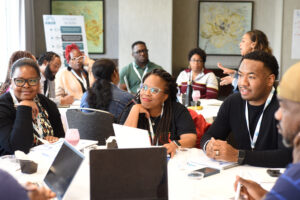Change is hard. It’s messy. The road to something better and more sustainable is paved with fits of subjective, clashing opinions. Steve Jobs once said that those who dare to dream big, to change the world—or some small piece of it, anyway—are seen as troublemakers, rebels, misfits. He said that “you can quote them, disagree with them, glorify or vilify them…about the only thing you can’t do is ignore them. Because they change things.”
That’s what Newark Superintendent Cami Anderson is after. Change. Giving families more school choices, closing or consolidating under-enrolled, under-performing schools, giving principals the opportunity to pick their own staff—all aspects of her One Newark plan. The plan represents major change in Newark, where the state has controlled the district for nearly 20 years. No one can credibly make the case that the city’s school system is working well for all 38,000 students, or that change of some kind is unnecessary.
The merits of her plan are not the subject of this post. Instead, I’m in search of answers to questions that plague leaders across all industries and walks of life. What are the true costs of leadership? Leading major change efforts may be messy, but shouldn’t we be worried if it weren’t? How do we make room for bold and inspirational public servants if those who dare to take on big issues become largely vilified—like Anderson?
We needn’t look very far for the heroic stories of leaders taking on the status quo or going against the grain for the sake of real progress. Consider Albert Shanker—the legendary American Federation of Teachers president who used his platform to challenge union members and advocate for student-focused reforms. His popularity was often in peril, but his leadership on issues that matter most cannot be disputed. Or Anne Mulcahy, who took the helm of Xerox in 1991 as it was teetering on the brink of bankruptcy. She led Xerox on a ‘back to basics’ journey, losing countless friends in the process. I’m sure that she wasn’t perfect, but Mulcahy was successful because she painted a picture of the future of Xerox for both her detractors and supporters—as though she’d already achieved that future. This is what Anderson is doing in Newark.
What does this type of leadership take? Tenacity. Resolve. Courage. A willingness to be vulnerable. Dreaming big, with deadlines. It means holding your ground as a leader who believes strongly in something better—even when the discourse becomes so uncivil that attacks hit close to home.
I saw this in action last week, when Anderson asked the state to waive regulations requiring that layoffs in Newark be done without regard to how well teachers do their jobs—so that if layoffs cannot be avoided, schools can at least hold on to their top teachers. With plenty of controversy already brewing, it’s not as if the timing was opportune. But that’s the point. Leaders advance the dialogue and take positions regardless of timing. They do what they believe is the right thing, not the easy thing.
That said, such leadership cannot endure in a vacuum, and this is perhaps the most urgent challenge facing Anderson. In Newark now, forget civil discourse—there is no conversation at all, and attacks on the superintendent have shifted from her policies to her family. While strong leaders are willing to be controversial, those attacks are out of any reasonable bounds. It’s an unhealthy climate that does a disservice to everyone associated with the Newark Public Schools.
As a leader, mother and concerned citizen, I’d like to see more Cami Andersons. We need more leaders willing to bring bold, fresh ideas to the table even if, and perhaps precisely when, they’re unpopular. I’d like to find ways to create the space for these leaders to share their plans in forums where attacks are confined to the ideas and not the person. If we fail at this, whether in education or any other arena, we make it that much harder for the next bench of leaders to step up. We all lose under that scenario.








